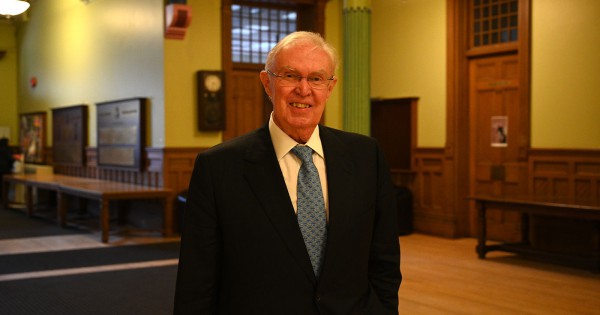Young People Key in Fight Against Autocracy: Professor David Wright

Former NATO ambassador David Wright, now a professor at Victoria College, says “the key to the future is young people with talent, courage and direction.” (Photo by Minh Truong)
By Joe Howell
“We’re meeting at quite a troubled time in international politics,” Professor David Wright told the audience gathered in Alumni Hall on March 22. That’s saying something—Wright witnessed no shortage of geopolitical turbulence during the 35 years he spent in the Canadian foreign service, before coming to teach at Victoria College.
“The war in Ukraine is the obvious manifestation of this, and what’s at stake in that conflict,” said Wright, during his lecture hosted by the VWA (Victoria Women’s Association). “We’re seeing a struggle between democracies and autocracies around the world.”
Wright has seen that struggle play out firsthand since joining the diplomatic corps in 1968, where he worked at the United Nations in New York and in various overseas postings. He was the assistant deputy minister for Europe after the Berlin Wall fell, helping shape Canada’s response to the collapse of the Soviet Union. Later, he became Canada’s longest-serving ambassador to NATO, where he dealt directly with the 9/11 attacks and hostilities in places like Bosnia, Kosovo, Afghanistan and Iraq.
In a wide-ranging talk that drew on his unique diplomatic experiences, Wright paid particular attention to Russian President Vladimir Putin. “Just to remind us, what has Putin done?” asked Wright. “He broke international law. He invaded a sovereign state that his country had recognized. He targeted civilians and civilian infrastructure and continues to do … it has been pure destruction. He has threatened the use of nuclear weapons.”
As the war in Ukraine stretches into its second year, no one is more surprised than Putin. “He underestimated Ukraine’s courage and capability. He overestimated Russia’s military competence. He also miscalculated Russian opposition to conscription, and provoked a serious exodus of talented, young, upwardly mobile Russians from the country,” said Wright.
What is the genesis of this self-destructive aggression? “There’s a psychological dimension to Putin,” said Wright. “He was humiliated by the dissolution of the USSR. When the Berlin Wall came down, Putin was a mid-ranking KGB official in East Germany … He deeply resents what he sees as western dominance.”
Wright offered his view on why the current conflict is so important to the world. “A lot is at stake in Ukraine—not just its borders and its security, but the rules-based international order and the future of democracy as opposed to autocracy,” said Wright. “How is this going to end? Probably some kind of brute determination on the battlefield is going to play a part in bringing the combatants to the negotiating table. But who would trust Putin to keep his word?”
Since leaving diplomacy in 2003, Wright has taught in the Lester B. Pearson Stream of the Vic One program, where he is the Kenneth and Patricia Taylor Distinguished Professor of Foreign Affairs. In his talk, he said “the key to the future is young people with talent, courage and direction. That’s why I care so much about education; that’s why I’ve taught here for 20 years.”
Asked how students can help bolster democracy and the rules-based order or otherwise resist authoritarianism, Wright said “you don’t have to be in government to have an impact. You can be a journalist, you can be an academic, you can be a businessperson, you can be a lawyer—you can be lots of different things, and still provide imagination and strength to the institutions that make our countries work well.”
After the lecture, I spoke with attendee James Janeiro, a graduate of Vic College who took two classes with Wright while in the Pearson Stream of Vic One. Since leaving Vic, Janeiro has worked extensively in politics, and is currently director of policy and government relations at the Canadian Centre for Caregiving Excellence.
“I sometimes find myself talking to impressive people like cabinet ministers or international experts, where I have to make a case for something. I would not be able to do that without having been through David Wright’s class—that is a unique skill that I picked up under his tutelage,” said Janeiro. “Professor Wright gives off this air of expertise, history, knowledge—he’s been in those rooms, he knows how all this stuff works, he embodies so much of what I wanted to do with my life. For a bright-eyed, bushy-tailed first-year student wanting to get into that sort of world, that was a very unique and special experience.”
The philanthropic support received from Vic alumni and friends makes professorships like David Wright’s possible. To learn more about how you too can make a difference to students at Vic, visit here.
The Victoria Women’s Association hosts five afternoon programmes throughout the academic year, presented primarily by notable Vic faculty and staff. At these gatherings, speakers who are prominent in their fields discuss a variety of topics, from science to the arts and beyond. The VWA also raises money annually for The Endowed Bursary Fund, for Vic students who are in financial need. Visit here to find out more about the VWA or to join this dynamic group of Victoria University supporters.
